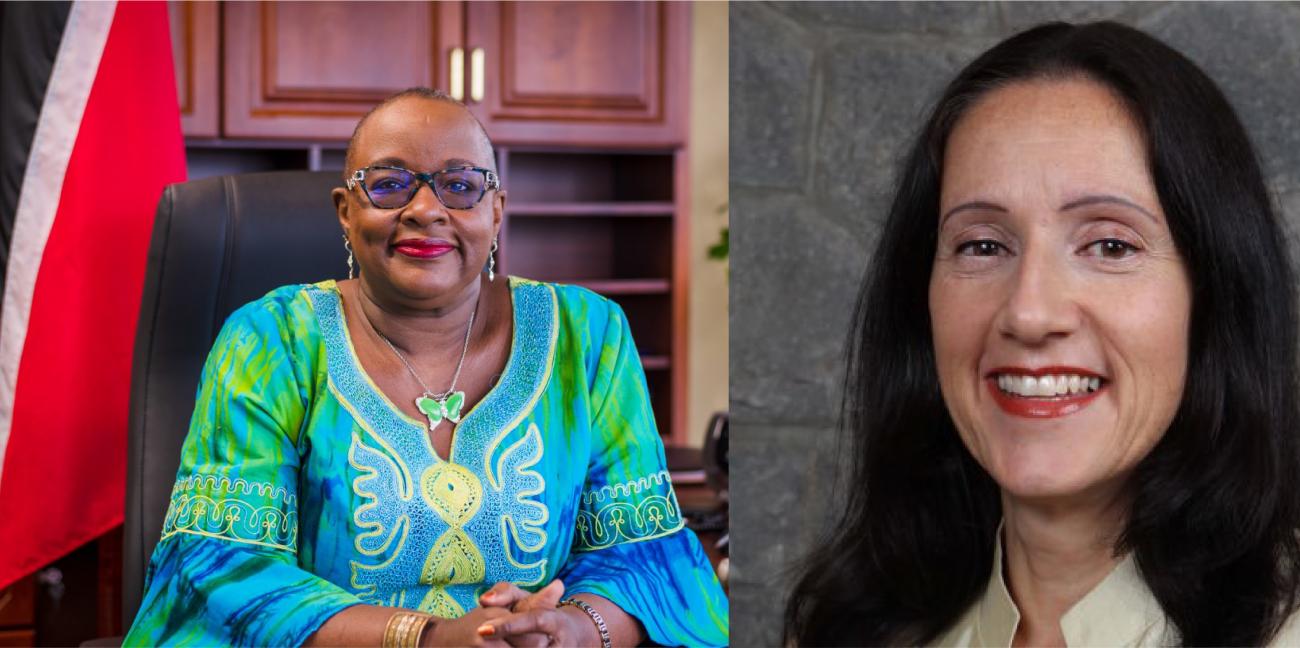COP26 and T&T’s Climate Action

Minister of Planning and Development, Camille Robinson-Regis, and Marina Walter, UN Resident Coordinator to T&T discuss Climate Action
By: Minister of Planning and Development, Camille Robinson-Regis, and Marina Walter, UN Resident Coordinator to T&T
When world leaders gather in Glasgow, Scotland next month for the UN’s watershed COP26 summit, Trinidad and Tobago will be represented among them, led by the Ministry of Planning and Development. The summit will take place on the heels of the UN’s 76th anniversary on October 24th, another milestone moment in global history.
Since T&T’s admission into the United Nations in 1962, the UN-TT partnership has focused on development assistance for disaster risk mitigation, human development, social development, education and health - especially during the COVID-19 pandemic. Next month at COP26, the UN-TT relationship continues its sharp focus on climate action.
Taking bold steps to fight climate change must take on new urgency given the concerning findings of the UN Intergovernmental Panel on Climate Change’s (IPCC) 6th Assessment Report (AR6). The report makes it clear that this era is one of the worst warming periods in history and constitutes the loudest wake up call to date for meaningful, and actionable, reductions in greenhouse gas emissions. As the Secretary General of the United Nations, António Guterres, put it, “We are on the edge of an abyss. And we are moving into the wrong direction.”
Human action has put so much carbon dioxide and greenhouse gas into the atmosphere, that it is possible for global temperatures to continue rising until the middle of this century. The Government of Trinidad and Tobago is taking the steps required to ensure it does its part to tackle this problem in our economy driven by oil and gas, chemicals and manufacturing. T&T has committed to reducing cumulative greenhouse gas emissions in the main emitting sectors of industry, power generation and transportation by 15% from a ‘business as usual baseline’ by December 31, 2030.
To achieve this, significant work has been done to establish a robust Monitoring, Reporting and Verification (MRV) System to track the progress of efforts to reduce greenhouse gas emissions in T&T. This is the first of its kind in CARICOM, and the UN – through its agency, the United Nations Development Programme (UNDP) - has played a significant role in arriving at this phase. The MRV creates a standardized framework and system to track emissions reductions and report relevant data about this progress.
Using grant funding and technical assistance from UNDP, the Ministry of Planning and Development has also recently completed an updated greenhouse gas inventory and validated its emissions baselines. With these in place, it is easier to accurately measure the country’s progress on its pledge to reduce emissions.
Aside from reducing its emissions, T&T is also improving its climate resilience by expanding its supply of renewable energy. A project between the T&T Government, the European Union Global Climate Change Alliance Plus (EU GCCA+) and the UNDP saw 12 small-scale roof-mounted Solar Photovoltaic (PV) panels installed across T&T. The €2.4 million project, which is funded by the EU and implemented by the UNDP, will support the creation of a national Feed-In-Tariff policy and an accompanying pricing structure, to allow for payments to be made to property owners who use renewable energy power generation as their source of electricity. The skills and knowledge required to install and service solar PV panels will be taught to local technicians, expanding the pool of human capital which can promote a renewable energy industry and an emerging green economy. In all, this project will support T&T to deliver on its Nationally Determined Contribution under the Paris Agreement for reduced greenhouse gas emissions. It will also enhance T&T’s ability to adopt renewable energy, from policy all the way to the end user experience.
Work is also in train to expand the infrastructure that supports electric vehicles, in keeping with global car manufacturing trends. To this end, the United Nations Environment Programme and Denmark Technical University (DTU/UNEP) are working to develop funding proposals for the installation of ultra-fast solar electric vehicle chargers in Trinidad and Tobago.
As a member of the Caribbean chain of Small Island Developing State (SIDS), T&T is particularly vulnerable to the consequences of climate change. Coastal erosion, inhospitable conditions for agriculture and intensifying storms are all risks that threaten the survival of small island states.
In the midst of the clear and present danger, there are opportunities. The prospects of a green economy fueled by renewable energy and clean energy alternatives bode well for T&T’s climate action and its resilience to already warming temperatures. Trinidad and Tobago can join other SIDS in advocating for ambitious action while leading as an example of a small-island, energy-producing nation.
Achieving the 17 Sustainable Development Goals (SDGs) will remain elusive if we cannot stabilise global temperatures. Climate change threatens progress on almost every single SDG if we do not slow the effects of warming now. While there is much more to be done, the Government and the UN are positive that through its continued working relationship, there is the possibility to make a difference - especially in bringing other SIDS and the more developed nations on board. As the UN turns 76, the UN and T&T renew their commitment to working together to tackling the greatest challenges of our time.
(This op-ed was originally published in the Trinidad Express on Wednesday, October 20, 2021)

